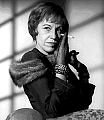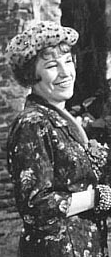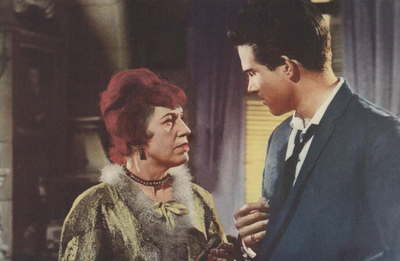 Way back in college, StinkyLulu read Tennessee Williams' novella The Roman Spring of Mrs. Stone over Thanksgiving break one year. And, simply put, Lulu's life was ever changed. Amidst a college orbit that pooh-poohed Tennessee Williams as maudlin and tacky, StinkyLu stood as a staunch (if under-read) advocate for Tennessee's strange magic. Thankfully, a much admired prof admonished Lulu: "You haven't really read Williams until you've read his fiction." It was a passing mention that sent Lulu on a Williams jag (plays, movies, fiction, memoir, biography) that continues, intermittently, to this day. And truly, as much as Lulu does love the plays, Tennessee's short fiction is what most amazes, enthralls and confounds Lulu, time after time after time. (Check out "Hard Candy" -- kazowie.)
Way back in college, StinkyLulu read Tennessee Williams' novella The Roman Spring of Mrs. Stone over Thanksgiving break one year. And, simply put, Lulu's life was ever changed. Amidst a college orbit that pooh-poohed Tennessee Williams as maudlin and tacky, StinkyLu stood as a staunch (if under-read) advocate for Tennessee's strange magic. Thankfully, a much admired prof admonished Lulu: "You haven't really read Williams until you've read his fiction." It was a passing mention that sent Lulu on a Williams jag (plays, movies, fiction, memoir, biography) that continues, intermittently, to this day. And truly, as much as Lulu does love the plays, Tennessee's short fiction is what most amazes, enthralls and confounds Lulu, time after time after time. (Check out "Hard Candy" -- kazowie.) Perhaps the most well-known of William's fiction, The Roman Spring of Mrs. Stone tells the story of faded actress Karen Stone (Vivien Leigh, in a great, under-appreciated performance) and her "assignation" with young Paolo (a shockingly pretty Warren Beatty). The story explores the collision of loneliness (Karen, a wealthy American widow listlessly wandering into middle age) with desperation (Paolo, a young man greedily struggling for survival in barely rebuilding post-WWII Italy). Whether on the page or on the screen, The Roman Spring of Mrs. Stone pivots upon one of Tennessee's most thrilling gifts, his adeptness at being at once explicit and oblique. The story's pervy particulars of pretty Italian gigolos hustling monied Americans on the Roman steps are just hanging right out there for all to see, yet somehow the lurid details remain unspoken. This -- staring at the filth while delicately stepping past it -- is Tennesee's trick of tone in this piece about denial, desperation and loneliness. (What the characters call "drift"...)
Perhaps the most well-known of William's fiction, The Roman Spring of Mrs. Stone tells the story of faded actress Karen Stone (Vivien Leigh, in a great, under-appreciated performance) and her "assignation" with young Paolo (a shockingly pretty Warren Beatty). The story explores the collision of loneliness (Karen, a wealthy American widow listlessly wandering into middle age) with desperation (Paolo, a young man greedily struggling for survival in barely rebuilding post-WWII Italy). Whether on the page or on the screen, The Roman Spring of Mrs. Stone pivots upon one of Tennessee's most thrilling gifts, his adeptness at being at once explicit and oblique. The story's pervy particulars of pretty Italian gigolos hustling monied Americans on the Roman steps are just hanging right out there for all to see, yet somehow the lurid details remain unspoken. This -- staring at the filth while delicately stepping past it -- is Tennesee's trick of tone in this piece about denial, desperation and loneliness. (What the characters call "drift"...)But a sense of menace haunts this drift, in the person of The Contessa, and portrayed on screen by the second of 1961's Best Supporting Actress nominees...
Strangely, StinkyLulu found it hard to focus on the character of the Contessa. She's just icky, and scary, and discomfiting. That guest who always shows up early to the party, eats/drinks/smokes everything in sight, drives nicer guests away early and yet, through some cruel twist of social fate, must be invited. Adorned with a meaningless title, outfitted with eccentricity, chattering endlessly about her alternately tragic/glorious life, The Contessa's a parasite.
More precisely, The Contessa's a pimp. Pimping boys like Paolo to monied matrons like Karen with aggrieved righteousness. Add it all up & it's a virtually impossible part to play, one of the toughest in the Williams repertoire. Even Anne Bancroft's portrayal of the part in the 2003 Helen Mirren version jumps the tracks & runs into squalid mannered monsterdom. Yes, The Contessa's the villain, at once entirely insufferable and ominously terrifying...but how to play her?
 Lotte Lenya's casting here is in itself a genius move. Unavoidably yet abstractly European, Lenya brings a surprisingly effective simplicity to the role. Lotte Lenya distills the character's many malevolent motives to one: hunger. Lenya's Contessa cares little about anything or anyone, except eating. Nearly every conversation, every interaction, turns to food. Will she be eating this week? When? What? It's a metaphor, of course; eating represents security at its basest. More than Paolo's cherished new clothes and crisp haircuts; more even than her own actuarial interests in the gifts received by her boys. All Lenya's Contessa cares about: will she eat?
Lotte Lenya's casting here is in itself a genius move. Unavoidably yet abstractly European, Lenya brings a surprisingly effective simplicity to the role. Lotte Lenya distills the character's many malevolent motives to one: hunger. Lenya's Contessa cares little about anything or anyone, except eating. Nearly every conversation, every interaction, turns to food. Will she be eating this week? When? What? It's a metaphor, of course; eating represents security at its basest. More than Paolo's cherished new clothes and crisp haircuts; more even than her own actuarial interests in the gifts received by her boys. All Lenya's Contessa cares about: will she eat? It's a garish, impolite hunger. Made all the more grotesque by Lotte Lenya's loose, goopy-at-the-consonants, manner of speaking. It's a bizarre genius tweaking even the most banal scenes. Lulu's favorite example comes when Lenya's Contessa descends on Leigh's Karen in the buffet line. The Contessa endeavors to drop a few doubt-bombs on Karen by telling the story of "poor Signora Coogan" who Paolo made so hysterical "that the poor thing broke out in a nervous eczema. She looked so hideous with the rash that she flew straight to Africa and hid herself in the jungles." Then, barely a beat, Lenya lifts her loaded fork to Leigh. "Little ham?" Always, Lenya's Contessa comes back to the food.
It's a garish, impolite hunger. Made all the more grotesque by Lotte Lenya's loose, goopy-at-the-consonants, manner of speaking. It's a bizarre genius tweaking even the most banal scenes. Lulu's favorite example comes when Lenya's Contessa descends on Leigh's Karen in the buffet line. The Contessa endeavors to drop a few doubt-bombs on Karen by telling the story of "poor Signora Coogan" who Paolo made so hysterical "that the poor thing broke out in a nervous eczema. She looked so hideous with the rash that she flew straight to Africa and hid herself in the jungles." Then, barely a beat, Lenya lifts her loaded fork to Leigh. "Little ham?" Always, Lenya's Contessa comes back to the food.Certainly, Lotte Lenya's performance in The Roman Spring of Mrs. Stone is a strange and frequently off-putting one. Yet, this time through, and for the first time attending to Lenya's work specifically, StinkyLulu's convinced that Lenya's Contessa stands among the most effective performances of a Tennessee Williams character on-screen. Thank goodness for this nomination, else Lulu might have kept avoiding Lenya's Contessa. (Cuz dang if she doesn't just squick Lulu out.)
And speaking of the nomination:
Does anyone have a clue as to how in the hell Lenya scored the nomination in the first place? She's hardly a Hollywood trouper (like the remaining nominees) and the character's hardly an exhilarating crowd pleaser (like Moreno)? And the performance itself is hardly conventional screen acting... So, lovely reader, any thoughts?




3 comments:
Given the lyrical name-dropping anyone with a radio had been hearing for the preceding few years, via Louis, Bobby, and Ella, she was an exotic household word by the time the film was released, well beyond her theatre fans. Probably didn't hurt.
I betcha that's it.
Mack the Knife prolly did secure her nom.
And let's not forget that 1954 revival of Threepenny with Bea Arthur, etc, with Lotte playing Pirate Jenny. I think though it was a few years previous, this may have been a role that was the first time a lot of people were able to see this legend in action.
Post a Comment